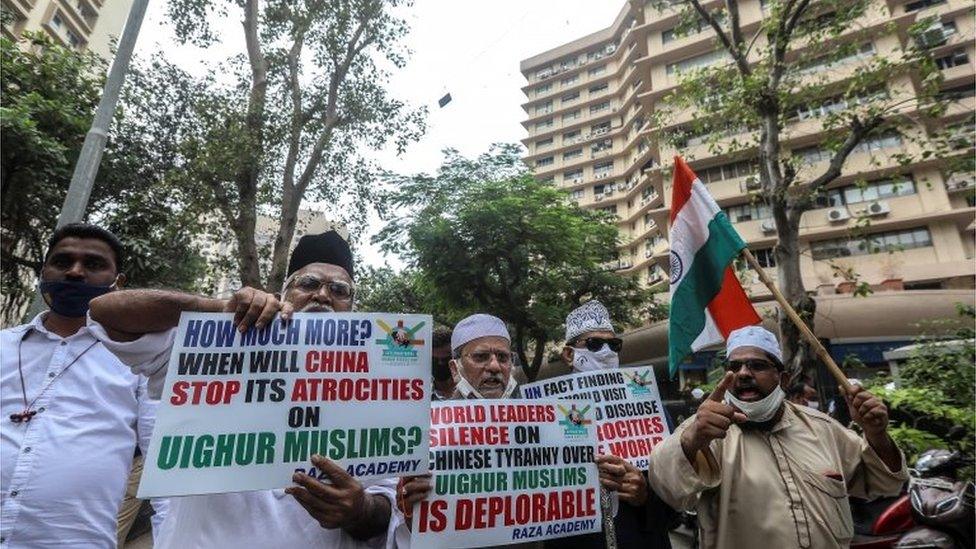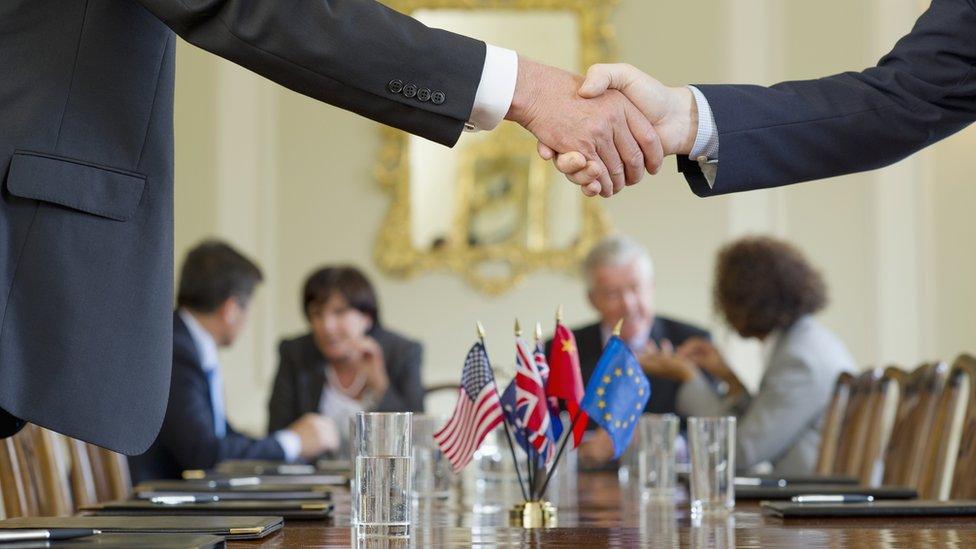Conservative rebel MPs pressure government over genocide clause
- Published

Protests against China's alleged abuse of the Muslim Uighur community
The government is facing a rebellion over the Trade Bill, and opposition proposals to give British courts the right to decide if a country is committing genocide.
Rebel Tory MPs want to allow Parliament to debate ending trade deals with countries responsible for genocide.
The government says trade policy should not be set by the courts.
But some MPs think the proposal would be a good way of targeting China and its treatment of the Uighur people.
On Tuesday, America's top diplomat Mike Pompeo, in his last day in the role, said the US had determined that China's persecution of the Muslim group and other minorities in Xinjiang province represented genocide and crimes against humanity under international law.
The UK has repeatedly condemned the actions of the Chinese authorities but stopped short of describing them as genocide - saying only international courts should determine this.
And ministers also argue that trade deals are matters for governments, not the courts, to decide upon.
The MPs' amendment to the Trade Bill is a watered-down version of an earlier proposal from the House of Lords, which would force the government to withdraw from any free trade agreement with any country found guilty of genocide by the High Court of England and Wales.
The new proposal is signed by 10 Conservative MPs, one of whom described their amendment as "tidier" than the Lords version and designed to attract more support.
Speaking in the Commons, Sir Edward Leigh asked "is there any way we can acknowledge that genocide is taking place in a discussion on a trade deal".
In response, International Trade minister Greg Hands said ministers were prepared to have further discussions but not within the scope of the current legislation.
He told MPs the government was "answerable to Parliament, not the courts" and the Lords version would have led to an "unacceptable erosion" of its authority.
The UK, he added, had "no plans" to negotiate a bilateral trade agreement with China due to concerns about its human rights record, particularly its persecution of the Muslim Uighur community.
'Ethical concerns'
Nusrat Ghani urged ministers to consider the "compromise" proposal, which she said recognised the "separation of powers" between the executive, Parliament and the courts.
The Conservative ex-minister said the UK should "never let economic concerns trump ethical ones by dealing with genocidal states".
"Why would we want to use our newfound freedom to trade with states that commit and profit from genocide? Britain is better than that."
Speaking to Politics Live, former Tory leader Iain Duncan Smith said it is currently "impossible" for international courts to rule on whether there has been genocide, as other countries can block hearings in the UN.
He argued it is therefore important to allow British courts to make the judgement.
The MP insisted he is not "anti-China" but said the Chinese government need to be "reasonable and behave in a way that is acceptable" if it wanted to be part of global trading organisations.
Shadow international trade secretary Emily Thornberry said Labour would be supporting the new amendment arguing that the government "does not consider human rights abuses enough before signing up to trade deals".


This is an interesting story in its own right because of the issues involved but it's also a neat metaphor for Brexit.
The government has taken back control of trade policy from the EU but is already having to share it with the House of Lords, Tory MPs and potentially with the High Court.
During the passage of the Trade Bill, the government also had to beef up the powers of the Trade and Agriculture Commission - an independent body of experts - in response to lobbying from farmers who were worried about the dilution of food standards.
Soon trade disputes with other countries will partly be overseen by the new Trade Remedies Authority, another organisation that reports to ministers but is independent of them.
And of course, everything has to be compatible with World Trade Organisation rules, anyway.
The government has control of trade. It's just not total.

Related topics
- Published4 August 2020

- Published19 January 2021
